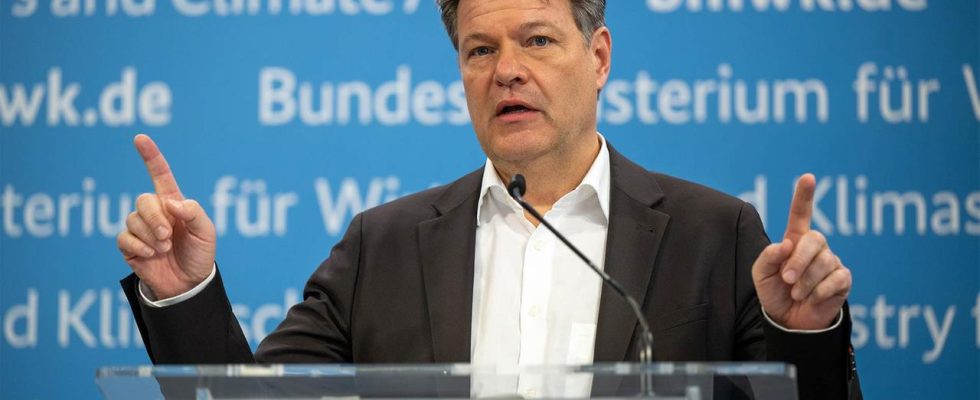In order to achieve climate goals, carbon dioxide from industrial plants will also be stored in the seabed in the future. There is criticism of Economics Minister Habeck’s plans from environmental associations – and also from the Greens.
Federal Minister of Economics Robert Habeck wants to create the conditions for climate-damaging carbon dioxide (CO2) to be captured and stored in certain sectors such as the cement or lime industry in the future. This should happen on the high seas, but marine protected areas would be excluded, said the Green politician in Berlin today. “The technology is safe.” The associated risks are manageable.
However, storage on land should remain prohibited. Changes to the law are now needed to allow the transport of captured CO2 from industrial processes, said Habeck. Some environmental associations warn that climate protection progress could be even slower internationally because the plans keep fossil fuel industries alive longer.
“We have to use what is available”
The so-called CCS is intended to help us become climate neutral by 2045. CCS stands for “Carbon Dioxide Capture and Storage”. What this means is that CO2 is captured during industrial processes, brought to an underground storage facility and stored there. The German climate target can only be achieved by storing CO2, said climate researcher Ottmar Edenhofer. Habeck emphasized: “We are no longer in a world in which we can cherry-pick, but in which we have to use what is available.” Time is up.
“The focus of our efforts is always to prevent emissions from occurring in the first place,” said the Economics Minister. State funding should therefore focus on emissions that are difficult or impossible to avoid. The Minister of Economic Affairs referred to other countries such as Norway, which followed a similar path.
However, it is controversial whether the technology should also be made possible where CO2 emissions can generally be avoided. For example, there should be no support for energy production where emissions can be avoided. Coal-fired power plants should also not have access to the pipeline network because the coal phase-out should remain the same. Things are different for gas power plants, to the dismay of environmentalists.
Criticism from environmental associations
German Environmental Aid spoke of “life-extending measures for fossil gas power plants”. If CO2 can be captured again, there will be less effort to avoid it. In addition, the North Sea will be converted into a waste disposal park. “We call on the Federal Cabinet and the Bundestag not to agree to this proposal,” said the environmental protection organization.
NABU Federal Managing Director Leif Miller also described it as a wrong signal to also include emissions from fossil power plants. “The focus must continue to be clearly on the expansion of renewable energies and the complete phase-out of fossil fuels,” he warned. BUND boss Olaf Bandt said Habeck was putting the exit from fossil fuels at risk. “CO2 waste dumps under the sea” could soon become a reality – despite dangerous risks to human health and marine life.
Greenpeace also criticized the plans. The strategy bears the hallmarks of the industry. It allows “business as usual” and slows down measures to avoid emissions, said Greenpeace energy expert Karsten Smid. A gigantic disposal infrastructure should be created. “Cross-border trade in CO2 waste promotes a new business model: the more CO2 is produced, the more money can be made.” In addition, it has not been scientifically proven that the CO2 repositories remain permanently sealed.
“Important step towards… climate neutrality”
Meanwhile, praise for the plans came from business and several industry associations. The general manager of the Federation of German Industries (BDI), Holger Lösch, emphasized: “The fundamental decision to clear the way for CO2 capture, storage and use (CCS & CCU) is an important step for the competitive transformation of German industry towards climate neutrality.” The key points of the carbon management strategy would create planning security for companies in the application and development of future-oriented technologies.
The Federal Association of the Energy and Water Industry (BDEW) also expressed a similar opinion: “The key points for a carbon management strategy published today are another important step towards climate neutrality. On the way to climate neutrality, the expansion of renewable energies in particular in the area of electricity generation and “The avoidance of CO2 emissions is central.” The BDEW considers it positive that there are currently no plans to store carbon onshore.
Schedule still unclear
Specifically, the Carbon Dioxide Storage Act is now to be changed in order to create the legal framework for the development of a CO2 pipeline infrastructure and to enable storage on the high seas. Habeck has so far discussed the planned reform with the Chancellery and the Ministry of Finance. There is a fundamental unity among the coalition partners, he said. But the official coordination with all federal ministries is still ongoing.
The Environment Ministry announced today that it would submit its position. A speaker highlighted the function of the oceans’ natural climate protection. We therefore welcome the fact that marine protected areas are excluded. Habeck said that he expected a quick agreement within the federal government so that the cabinet could agree. He couldn’t say exactly when storage would become a reality. A few years would pass. The pipeline network should be operated by private companies.
There could be more heated discussions in the Bundestag – including in Habeck’s own Green party. At its federal party conference at the end of November 2023, the party actually only supported a change of course on unavoidable emissions. The party had previously strictly rejected the technology. “The Green parliamentary group rejects CCS in gas power plants,” said Green MP Lisa Badum today. FDP MP Lukas Köhler, on the other hand, described the plans as a historic milestone on the path to climate neutrality.
Martin Polansky, ARD Berlin, tagesschau, February 26, 2024 11:48 a.m

